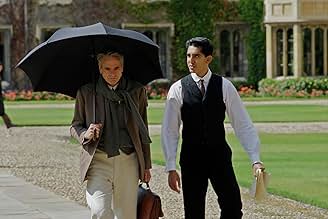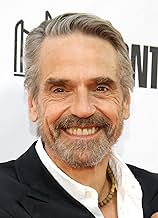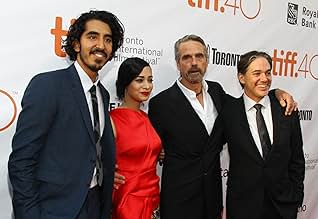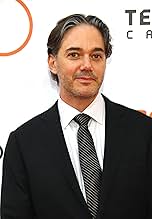CALIFICACIÓN DE IMDb
7.2/10
65 k
TU CALIFICACIÓN
La historia y vida del genio matemático indio Srinivasa Ramanujan y su amistad con su mentor, el profesor G.H. Hardy.La historia y vida del genio matemático indio Srinivasa Ramanujan y su amistad con su mentor, el profesor G.H. Hardy.La historia y vida del genio matemático indio Srinivasa Ramanujan y su amistad con su mentor, el profesor G.H. Hardy.
- Premios
- 1 premio ganado y 3 nominaciones en total
Dhritiman Chatterjee
- Narayana Iyer
- (as Dhritiman Chaterji)
Kevin McNally
- Major Percy Alexander MacMahon
- (as Kevin R. McNally)
- Dirección
- Guionistas
- Todo el elenco y el equipo
- Producción, taquilla y más en IMDbPro
Opiniones destacadas
Just saw "The Man Who Knew Infinity" at The Sun Valley Film Festival. So happy to see quality films make their US premiere in Sun Valley. Kudos to the non profit group. Must see movie with outstanding story, production and casting led by J. Irons. Independent films like these deserve to be seen & noticed. Opens NY/LA late April. Superb direction from Matt Brown with incredible sets and locations, especially location at Trinity College. Thought about the diversity issue facing the Academy and after seeing this movie, realized it was an issue for a brilliant mind like the lead against the English back in the day. The effort it took to make this film on a tight budget with incredible locations is a credit to the entire crew!
Just saw this film at the SF Film Festival. I thought it was excellent. Why? It combines various levels of entertainment: the intellectual mathematics involved and the realities of academic competition; the historical and cultural conflicts between Indian and English traditions, attitudes, biases, and beliefs; the emotional love/friendship between men, between men and women, and between children and parents; and inhumanity towards other humans: warmongers vs. pacifists, religious vs. non-religious, individuals vs. groups, misunderstandings and lack of emotional intelligence in so many ways.
I comprehended very little of the mathematics involved but that did not matter and did not change my overall appreciation for the story and all the levels involved.
Kudos to all who created this film. The writing, the acting, the cinematography, the direction, all excellent...
I comprehended very little of the mathematics involved but that did not matter and did not change my overall appreciation for the story and all the levels involved.
Kudos to all who created this film. The writing, the acting, the cinematography, the direction, all excellent...
"The Man Who Knew Infinity" is a very unlikely film for me to love. After all, the film is about a brilliant Indian mathematician who I never heard about and lacks most of the usual story elements I look forward to seeing in a movie. And yet, inexplicably, I found myself loving the picture and recommend you give it a try. It's just debuted on DVD and is also available through Netflix.
The film begins in India just before WWI. A poor man with little education, Srinivasa Ramanujan (Dev Patel), has apparently taught himself advanced mathematics....and I am not just talking about Algebra and Geometry. It seems this man somehow naturally understood numbers in a way very, very have ever done and today he's seen as one of the foremost men in the field...ever! This film is about his life just before his work was discovered as well as his time spent at Cambridge, working with the famous mathematics professor, G.H. Hardy (Jeremy Irons). The film covers the prejudices Ramanujan encountered as well as the initial difficulty getting folks to even consider that he could be right when it came to his theories.
I know my very brief description sounds very dull...but somehow it isn't. Somehow, the writing, acting and the entire production screams quality and manages to be quite entertaining as well as uplifting. It's also nice to see Dev Patel in yet another excellent film, as this young man seems to have a real knack for picking film projects (such as his appearing in "Slumdog Millionaire" and "Chappie"). As for Irons, he is, as usual, amazing...as is Toby Jones. A very, very strange film....and I mean that in the most positive of ways. Do yourself a favor and give this one a try.
The film begins in India just before WWI. A poor man with little education, Srinivasa Ramanujan (Dev Patel), has apparently taught himself advanced mathematics....and I am not just talking about Algebra and Geometry. It seems this man somehow naturally understood numbers in a way very, very have ever done and today he's seen as one of the foremost men in the field...ever! This film is about his life just before his work was discovered as well as his time spent at Cambridge, working with the famous mathematics professor, G.H. Hardy (Jeremy Irons). The film covers the prejudices Ramanujan encountered as well as the initial difficulty getting folks to even consider that he could be right when it came to his theories.
I know my very brief description sounds very dull...but somehow it isn't. Somehow, the writing, acting and the entire production screams quality and manages to be quite entertaining as well as uplifting. It's also nice to see Dev Patel in yet another excellent film, as this young man seems to have a real knack for picking film projects (such as his appearing in "Slumdog Millionaire" and "Chappie"). As for Irons, he is, as usual, amazing...as is Toby Jones. A very, very strange film....and I mean that in the most positive of ways. Do yourself a favor and give this one a try.
Biopics have always interested me, regardless of whether liberties are taken with the facts (the case with quite a lot) many of them are very well made and fascinating while also featuring lead performances that do the subject in question justice. Srinivasa Ramanujan, his story and his ground-breaking contributions to mathematics also fascinate and worth telling and looking up, and it was great to have the opportunity to have them better known.
Another selling point for me was Jeremy Irons, have always loved him if again more for his early work up to 'Lolita'. Although he is deservedly lauded by many, to me he is deserving of more credit, due to generally being restricted to (mostly) supporting roles in hit (this, 'The Borgias', 'Margin Call' and 'Henry IV' for examples) and miss ('Assassins Creed', 'Batman v Superman', 'The Time Machine', though he was among the better assets in all three, and especially 'Dungeons and Dragons' which is in every way indefensible) output since 'Lolita' that don't show his full talent, even when in a vast majority of them he is one of the bright spots, that people sometimes forget how brilliant a lot of his early work is. This does sound irrelevant, but it isn't really once saying what my thoughts on his performance here is and how it fares compared to his other work. Despite what 'The Man Who Knew Infinity' had going for it, part of me was not sure as to whether it would completely work for me, with Maths always having been one of my least favourite subjects in school. Never got my head around some of it and it didn't engage me as much as Music, History, English, French and German did, while always appreciating its importance and why it is considered a compulsory subject in primary and secondary schools up to A-Levels.
On the most part, 'The Man Who Knew Infinity' was a winner and struck a chord with me. It is nowhere near close to flawless and it falls short of being a great film. It is though well-intended and earnest, that mostly compels and much of it well written and acted. Despite inaccuracies and what made Ramanujan's work so ground-breaking not delved into enough it does try to treat this remarkable man and his story respectfully and does well in making Maths interesting and accessible. Very like 'A Beautiful Mind', 'The Man Who Knew Infinity' helped make me appreciate Maths much more.
Didn't find the scenes in Madras/India depicting Ramanujan's personal life anywhere near as interesting as the scenes in Cambridge and particularly the scenes between Ramanujan and Hardy, and to me they are the film's biggest fault. They are nicely filmed and the scenery is beautiful and it did show his motivations which was great. Unfortunately, they are also far too slow-paced (which hurt especially the first twenty five or so minutes when we don't see Hardy), mostly uneventful when the film is switching back and forth, contains very soapy writing, indifferent chemistry between Ramanujan and his wife and the acting has been described before as a mix of cold and exaggerated which sums it up very well.
There are moments of less than elegant camera work, indicating some inexperience, where some shots are disappointingly out of focus in a way that makes one slightly queasy. Can understand the criticism of 'The Man Who Knew Infinity' not doing much new for the biopic genre and playing it too conventionally and safely, with an outcome that is foreseeable and slightly on the pat side. And as said, it could have delved more into what made Ramanujan's work so ground-breaking and focused less on his personal life.
However, 'The Man Who Knew Infinity' does have quite a lot working in its favour. The photography is not consistent but quite a lot of it is nicely done and complements the beautifully evocatively rendered Indian landscapes and the authentic 1914 Cambridge setting very well. Trinity College is shown in all its glory, in both the exteriors and interiors it looks wonderful. The music may not stick in the head but it serves its purpose well, it's sympathetic, not too syrupy and it fits at least. Again, there is inconsistency in the direction, not always focused visually and very pedestrian in the scenes in Madras, but it helps make the story intriguing and accessible and is a triumph in the scenes between Ramanujan and Hardy (particularly in the latter stages), Hardy and Littlewood's scenes are also well done.
Script is mostly intelligent and sincere, not being too wordy, too complicated, too treacly or overly simple. It is especially good in Hardy's dialogue and speeches which are beautifully written (especially the "who are we to question the Ramanujan" one). Irons' Shakespearean-like delivery in that wonderful unmistakable voice he has, that always makes things that are usually dull engaging, helps quite a bit. The story once it got going engaged, moved and inspired me, didn't understand all the maths but it still intrigued and illuminated me and found myself really caring and identifying with Ramanujan, rooting for his overcoming significant adversity. The chemistry between Ramanujan and Hardy is complex, never biased, intriguing to watch develop and heartfelt, it is the heart of the film and the driving force of the drama and one of the film's biggest strengths in that it rises the film above being completely routine. The characterisation of Hardy is similarly a triumph, a far more complex character that one seems to think when first introduced to him, the most developed (more so than Ramanujan himself and that is without seeing glimpses of his personal life really) and therefore the most interesting. Really appreciated how Ramanujan's adversity is not done in a way that was overdone or pantomimic, some of it having genuine tension, and also showing the harships England were going through at the time.
Notwithstanding big reservations with how Ramanujan's family were characterised here, the acting is very good. Dev Patel may not look like Ramanujan, too young, too tall and too handsome, and may seem a miscast physically, but is still great in interpretation due to exuding more emotion, charm and passion than seen before from him by me and made me care and root for such a remarkable man. To me, this is one of his better performances and he works incredibly well with Irons, the complexities of the relationship between the two portrayed with nuance and passion. Their scenes in the second half of the film are particularly beautifully done and the ending is initially inspiring and then very touching in Hardy's tribute. Toby Jones is endearing as Littlewood and the British cast, including Anthony Calf and Jeremy Northam, are sterling and don't overplay or phone in. The acting honours though belong to Irons, who is absolutely outstanding here as Hardy and gives one of his best performances in one of not many roles in recent years to fully show how great an actor he truly is (he actually shows it in a vast majority of his work, just that too many times he is well above what he is given). Because there is a lot of meat to Hardy and Irons wrings every ounce of juice out of it without ever overplaying, his eyes, gestures and face telling so much in a remarkably subtle way, yes there is much more to Irons' appeal than his voice. It is an authoritative and sincere performance in a way that's powerfully understated, full of gravitas and never less than compelling, he brings an edge to Hardy while expertly softening it when needed in the emotional latter stages when he becomes more sympathetic. The lack of big awards attention for his performance here is in my mind criminal and like 'Dead Ringers' (except not as bad) all over again in that it was a big inexplicable oversight that year.
Summarising, a well above average film though not flawless or great, though Trinity College, the chemistry between Patel and Irons and Irons' performance are massive assets and help make it a much better film. 7/10
Another selling point for me was Jeremy Irons, have always loved him if again more for his early work up to 'Lolita'. Although he is deservedly lauded by many, to me he is deserving of more credit, due to generally being restricted to (mostly) supporting roles in hit (this, 'The Borgias', 'Margin Call' and 'Henry IV' for examples) and miss ('Assassins Creed', 'Batman v Superman', 'The Time Machine', though he was among the better assets in all three, and especially 'Dungeons and Dragons' which is in every way indefensible) output since 'Lolita' that don't show his full talent, even when in a vast majority of them he is one of the bright spots, that people sometimes forget how brilliant a lot of his early work is. This does sound irrelevant, but it isn't really once saying what my thoughts on his performance here is and how it fares compared to his other work. Despite what 'The Man Who Knew Infinity' had going for it, part of me was not sure as to whether it would completely work for me, with Maths always having been one of my least favourite subjects in school. Never got my head around some of it and it didn't engage me as much as Music, History, English, French and German did, while always appreciating its importance and why it is considered a compulsory subject in primary and secondary schools up to A-Levels.
On the most part, 'The Man Who Knew Infinity' was a winner and struck a chord with me. It is nowhere near close to flawless and it falls short of being a great film. It is though well-intended and earnest, that mostly compels and much of it well written and acted. Despite inaccuracies and what made Ramanujan's work so ground-breaking not delved into enough it does try to treat this remarkable man and his story respectfully and does well in making Maths interesting and accessible. Very like 'A Beautiful Mind', 'The Man Who Knew Infinity' helped make me appreciate Maths much more.
Didn't find the scenes in Madras/India depicting Ramanujan's personal life anywhere near as interesting as the scenes in Cambridge and particularly the scenes between Ramanujan and Hardy, and to me they are the film's biggest fault. They are nicely filmed and the scenery is beautiful and it did show his motivations which was great. Unfortunately, they are also far too slow-paced (which hurt especially the first twenty five or so minutes when we don't see Hardy), mostly uneventful when the film is switching back and forth, contains very soapy writing, indifferent chemistry between Ramanujan and his wife and the acting has been described before as a mix of cold and exaggerated which sums it up very well.
There are moments of less than elegant camera work, indicating some inexperience, where some shots are disappointingly out of focus in a way that makes one slightly queasy. Can understand the criticism of 'The Man Who Knew Infinity' not doing much new for the biopic genre and playing it too conventionally and safely, with an outcome that is foreseeable and slightly on the pat side. And as said, it could have delved more into what made Ramanujan's work so ground-breaking and focused less on his personal life.
However, 'The Man Who Knew Infinity' does have quite a lot working in its favour. The photography is not consistent but quite a lot of it is nicely done and complements the beautifully evocatively rendered Indian landscapes and the authentic 1914 Cambridge setting very well. Trinity College is shown in all its glory, in both the exteriors and interiors it looks wonderful. The music may not stick in the head but it serves its purpose well, it's sympathetic, not too syrupy and it fits at least. Again, there is inconsistency in the direction, not always focused visually and very pedestrian in the scenes in Madras, but it helps make the story intriguing and accessible and is a triumph in the scenes between Ramanujan and Hardy (particularly in the latter stages), Hardy and Littlewood's scenes are also well done.
Script is mostly intelligent and sincere, not being too wordy, too complicated, too treacly or overly simple. It is especially good in Hardy's dialogue and speeches which are beautifully written (especially the "who are we to question the Ramanujan" one). Irons' Shakespearean-like delivery in that wonderful unmistakable voice he has, that always makes things that are usually dull engaging, helps quite a bit. The story once it got going engaged, moved and inspired me, didn't understand all the maths but it still intrigued and illuminated me and found myself really caring and identifying with Ramanujan, rooting for his overcoming significant adversity. The chemistry between Ramanujan and Hardy is complex, never biased, intriguing to watch develop and heartfelt, it is the heart of the film and the driving force of the drama and one of the film's biggest strengths in that it rises the film above being completely routine. The characterisation of Hardy is similarly a triumph, a far more complex character that one seems to think when first introduced to him, the most developed (more so than Ramanujan himself and that is without seeing glimpses of his personal life really) and therefore the most interesting. Really appreciated how Ramanujan's adversity is not done in a way that was overdone or pantomimic, some of it having genuine tension, and also showing the harships England were going through at the time.
Notwithstanding big reservations with how Ramanujan's family were characterised here, the acting is very good. Dev Patel may not look like Ramanujan, too young, too tall and too handsome, and may seem a miscast physically, but is still great in interpretation due to exuding more emotion, charm and passion than seen before from him by me and made me care and root for such a remarkable man. To me, this is one of his better performances and he works incredibly well with Irons, the complexities of the relationship between the two portrayed with nuance and passion. Their scenes in the second half of the film are particularly beautifully done and the ending is initially inspiring and then very touching in Hardy's tribute. Toby Jones is endearing as Littlewood and the British cast, including Anthony Calf and Jeremy Northam, are sterling and don't overplay or phone in. The acting honours though belong to Irons, who is absolutely outstanding here as Hardy and gives one of his best performances in one of not many roles in recent years to fully show how great an actor he truly is (he actually shows it in a vast majority of his work, just that too many times he is well above what he is given). Because there is a lot of meat to Hardy and Irons wrings every ounce of juice out of it without ever overplaying, his eyes, gestures and face telling so much in a remarkably subtle way, yes there is much more to Irons' appeal than his voice. It is an authoritative and sincere performance in a way that's powerfully understated, full of gravitas and never less than compelling, he brings an edge to Hardy while expertly softening it when needed in the emotional latter stages when he becomes more sympathetic. The lack of big awards attention for his performance here is in my mind criminal and like 'Dead Ringers' (except not as bad) all over again in that it was a big inexplicable oversight that year.
Summarising, a well above average film though not flawless or great, though Trinity College, the chemistry between Patel and Irons and Irons' performance are massive assets and help make it a much better film. 7/10
The Man Who Knew Infinity is a lush, romantic biopic in the tradition of Hollywood's grand biographical melodramas of yesteryear. It is broadly accurate, if rather sentimental, but also somewhat superficial. We're constantly told that Ramanujan's work is important and ground- breaking, yet the screenplay mostly fails to demonstrate why this is so. We're shown how difficult life is for a vegetarian in England during the Great War, yet, oddly, it's never explicitly stated that the resulting vitamin deficiencies contributed directly to Ramanujan's demise. But for me the biggest flaw is the misplaced romance between Ramanujan and his wife, Janaki, when the more compelling romance is the intellectual one that unfolds between Ramanujan and G.H. Hardy. In reality, Janaki was nine or ten when Ramanujan married her in 1909, and only 14 or 15 when he left India for England. She was certainly not the ripe beauty portrayed in the film, and there is no real evidence that their arranged marriage was any kind of grand passion. The film is also strangely coy in avoiding any direct reference to Hardy's homosexuality. Perhaps the writer was being scrupulous about not implying any sexual aspect to the relationship with Ramanujan. Whatever the reason, it's an omission that makes Hardy less dimensional and airbrushes his sexuality from history as completely as a 1950s Hollywood biopic might have done. That aside, Jeremy Irons gives what might well be the best performance of his career as Hardy. It's a compelling and deeply touching portrayal. More surprisingly, Dev Patel - after a series of exuberant but lightweight performances - finally proves to be an actor with some depth and range. The film is also deftly directed, with some gorgeous cinematography.
¿Sabías que…?
- TriviaThroughout his life, Srinivasa Ramanujan was plagued by health problems. His health worsened in England. A 1994 analysis of Ramanujan's medical records and symptoms by Dr. D. A. B. Young concluded that it was much more likely he had hepatic amoebiasis, an illness then widespread in Madras, rather than tuberculosis. He had two episodes of dysentery before he left India. When not properly treated, dysentery can lie dormant for years and lead to hepatic amoebiasis. Amoebiasis was a treatable and often curable disease at the time.
- ErroresCambridge was not bombed by Zeppelins in World War I.
- Citas
Littlewood: Don't be intimidated. Great knowledge comes from the humblest of origins.
- Créditos curiososCard before the title: "Mathematics, rightly viewed, possesses not only truth but supreme beauty." - Bertrand Russell
- ConexionesFeatured in The Saturday Show: Episode #1.24 (2016)
Selecciones populares
Inicia sesión para calificar y agrega a la lista de videos para obtener recomendaciones personalizadas
- How long is The Man Who Knew Infinity?Con tecnología de Alexa
Detalles
- Fecha de lanzamiento
- Países de origen
- Sitios oficiales
- Idiomas
- También se conoce como
- The Man Who Knew Infinity
- Locaciones de filmación
- Productoras
- Ver más créditos de la compañía en IMDbPro
Taquilla
- Presupuesto
- USD 10,000,000 (estimado)
- Total en EE. UU. y Canadá
- USD 3,866,794
- Fin de semana de estreno en EE. UU. y Canadá
- USD 80,325
- 1 may 2016
- Total a nivel mundial
- USD 12,252,684
- Tiempo de ejecución1 hora 48 minutos
- Color
- Relación de aspecto
- 2.39 : 1
Contribuir a esta página
Sugiere una edición o agrega el contenido que falta

Principales brechas de datos
What is the streaming release date of El Hombre Que Conocía El Infinito (2015) in India?
Responda








































